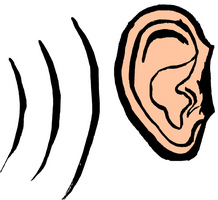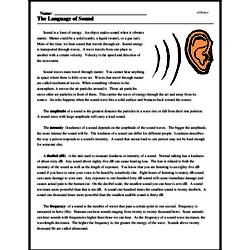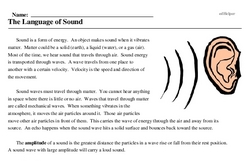The Language of Sound
Sound is a form of energy. An object makes sound when it vibrates matter. Matter could be a solid (earth), a liquid (water), or a gas (air). Most of the time, we hear sound that travels through air. Sound energy is transported through waves. A wave travels from one place to another with a certain velocity. Velocity is the speed and direction of the movement.
Sound waves must travel through matter. You cannot hear anything in space where there is little or no air. Waves that travel through matter are called mechanical waves. When something vibrates in the atmosphere, it moves the air particles around it. Those air particles move other air particles in front of them. This carries the wave of energy through the air and away from its source. An echo happens when the sound wave hits a solid surface and bounces back toward the source.
The amplitude of a sound is the greatest distance the particles in a wave rise or fall from their rest position. A sound wave with large amplitude will carry a loud sound.
The intensity (loudness) of a sound depends on the amplitude of the sound waves. The bigger the amplitude, the more intense the sound will be. The loudness of a sound can differ for different people. Loudness describes the way a person responds to a sound's intensity. A sound that seems loud to one person may not be loud enough for someone else.
A decibel (dB) is the unit used to measure loudness or intensity of a sound. Normal talking has a loudness of about sixty dB. Any sound above eighty-five dB can cause hearing loss. The loss is related to both the intensity of the sound as well as the length of exposure. You know that you are listening to an eighty-five dB sound if you have to raise your voice to be heard by somebody else. Eight hours of listening to ninety dB sound can cause damage to your ears. Any exposure to one hundred forty dB sound will cause immediate damage and causes actual pain to the human ear. On the decibel scale, the smallest sound you can hear is zero dB. A sound ten times more powerful than that is ten dB. A sound one hundred times the smallest sound is twenty decibels. A sound one thousand times more powerful than the smallest audible sound is thirty dB.




